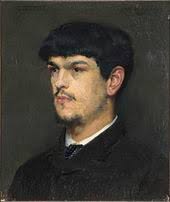2. A VERY STRANGE MAN?

“I honestly don’t know if Debussy ever loved anybody really. He loved his music – and perhaps himself. I think he was wrapped up in his genius…. He was a very, very strange man.”
—Mary Garden, who premiered Mélisande in the original production of Pelléas et Mélisande
So, how strange was this very, very strange man?
A few bare and random facts:
– Claude Debussy lived a Bohemian life, for much of it, anyway.
– He was the oldest of five children and grew up in Paris. There is no traceable artistic talent in his ancestry.
– His father was imprisoned, and his mother educated him at home.
– His talent, recognized by age 10, gained him admittance into the Paris Conservatory. An evaluation at age 12 included this note: “Charming child, true temperament of an artist; will become a distinguished musician; a great future.” At age 17, another one said this: “Extremely gifted in harmony, but desperately careless.”
– He won the Prix de Rome and claimed he was utterly miserable in the Eternal City for two years. He did not warm to his fellow musicians and claimed he could produce little of value. (From a letter of 1886: “My fellow students have come to regard me with a certain animosity. They accuse me, unfairly, of trying to parade my individuality, or else they philosophize all over me in a style which, I dare say, they picked up in the bars on the boulevard Saint-Michel….”)
– In Rome he kept up correspondence with Eugène Vasnier, a friend and wealthy building contractor, with whose wife he was having an affair. In fact, Debussy would have several tempestuous affairs, with women married and not, before settling down to a “respectable life,” yet one that still could not give him peace.
– His letters reveal him to have been a friend of poets, painters, composers and musicians. He valued those with whom he had “artistic sympathies.”
– They also reveal that he compartmentalized his friendships, had quite the acerbic tongue, and not a little ill humor. But this is only part of a big story. What is ultimately revealed is a composer who had complete clarity of vision for the music he wanted to write. And that music was a complete departure from the status quo. On this point Debussy was unbending: “Works of art make rules; rules do not make works of art.”
* * *
Here then, are two songs sung by soprano Mary Garden, the very same one whose words opened today’s blog.
The first is Debussy’s earliest published song, Beau soir, recorded here in 1929.
And for the second, by the miracle of YouTube, you can hear Debussy at the piano, as the two performed together one of his finest songs, Green, from his spectacular Ariettes oubliées, written during his stay in Rome. The recording is from 1904.
Enjoy!
Beau soir (1880 – written when Debussy was 18)
When streams turn pink in the setting sun,
And a slight shudder rushes through the wheat fields,
A plea for happiness seems to rise out of all things
And it climbs up towards the troubled heart.
A plea to relish the charm of life
While there is youth and the evening is fair,
For we pass away, as the wave passes:
The wave to the sea, we to the grave.
Green (from Ariettes oubliées, composed mostly in Rome in 1886, completed in Paris in March 1887)
Here are fruits, flowers, leaves and some branches,
And then here is my heart, which beats only for you.
Do not tear it apart with your two white hands,
And may the humble present be sweet in your beautiful eyes!
I arrive all covered in dew,
The morning wind chills it upon my forehead.
Suffer my weariness as I repose at your feet,
Dreaming of the hour that will refresh me.
On your young breast allow my head to rest,
Still ringing with your last kisses;
Till it recover from the stormy thrill,
And let me sleep a little, since you rest.
